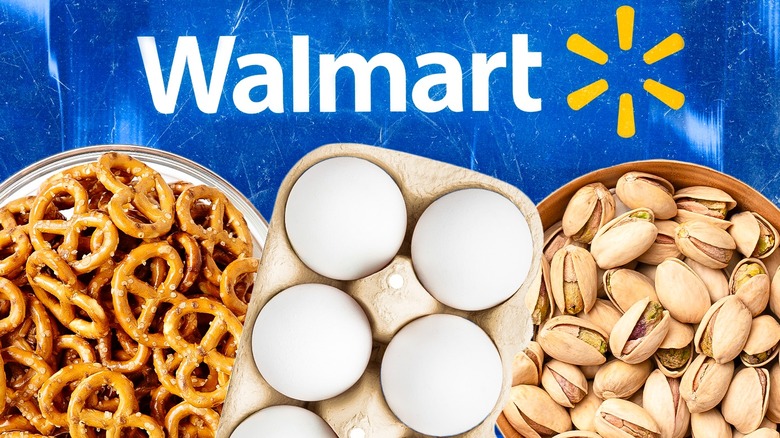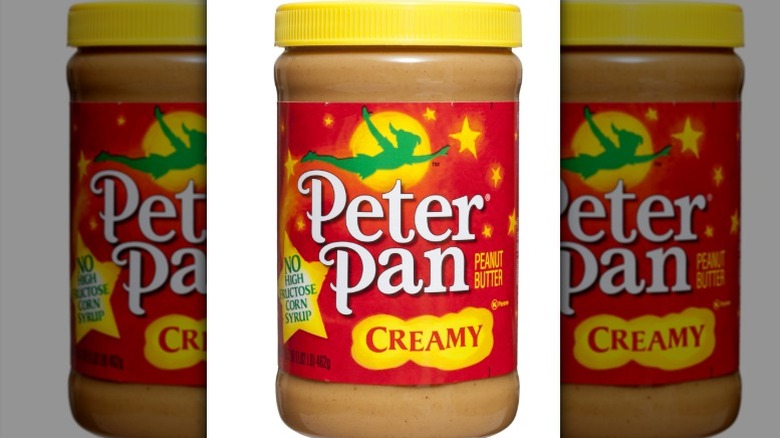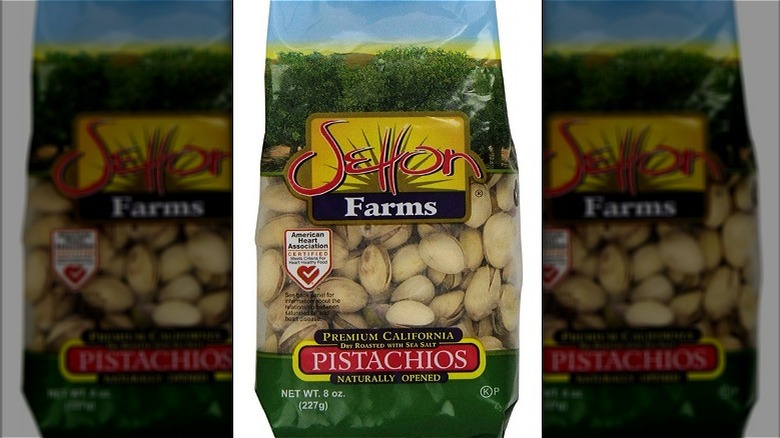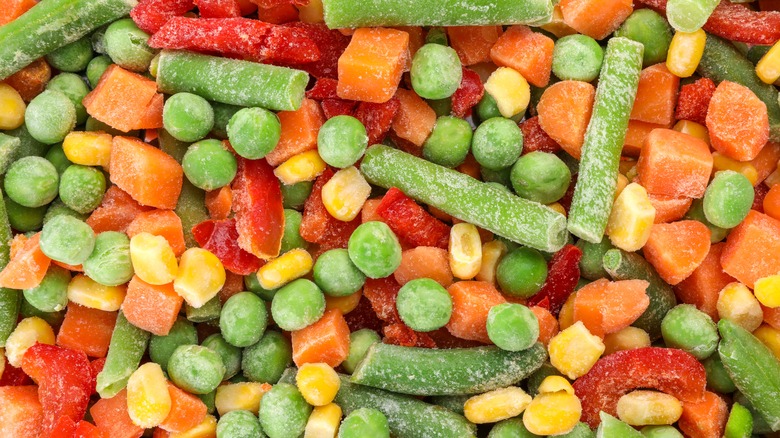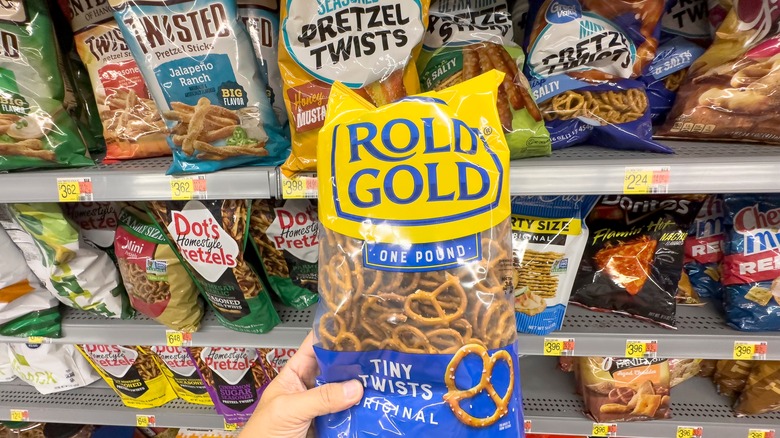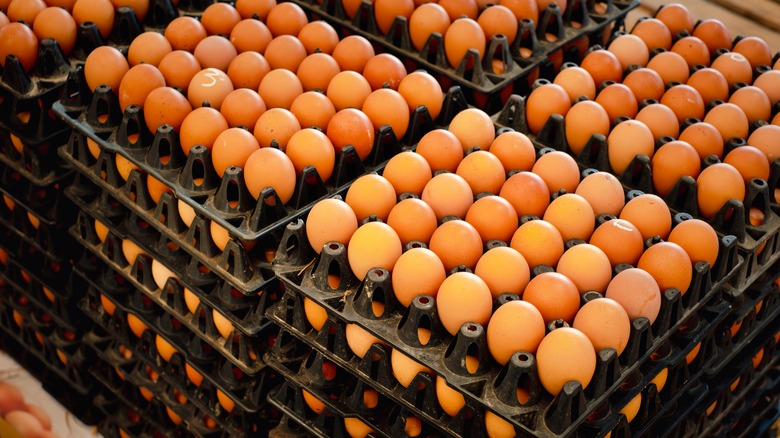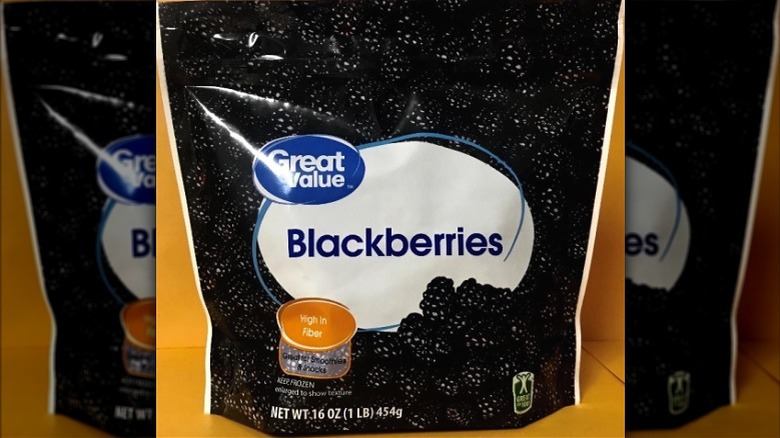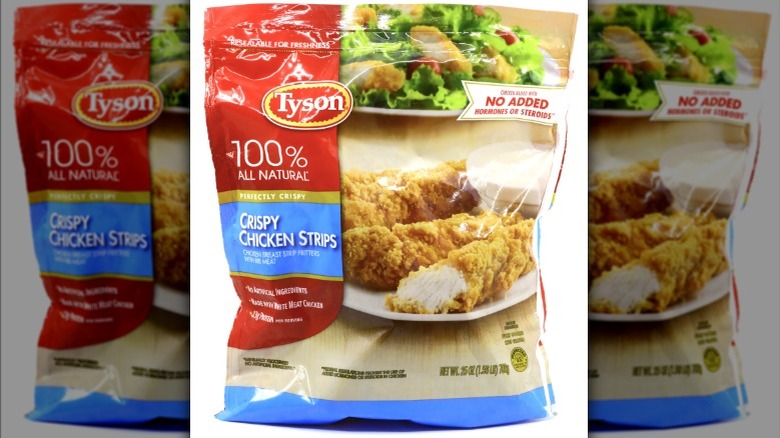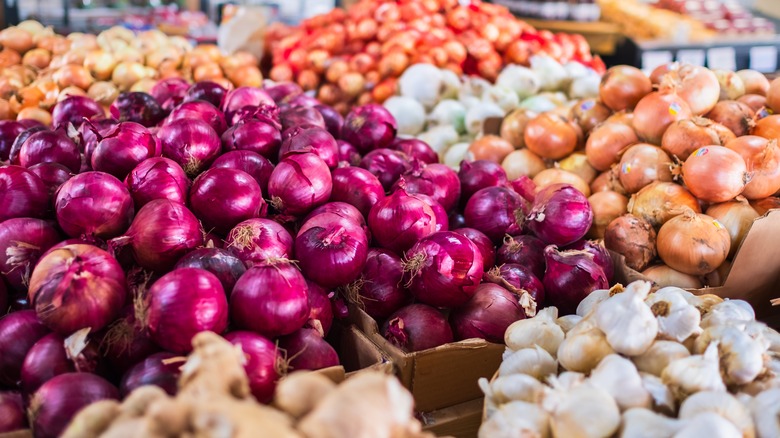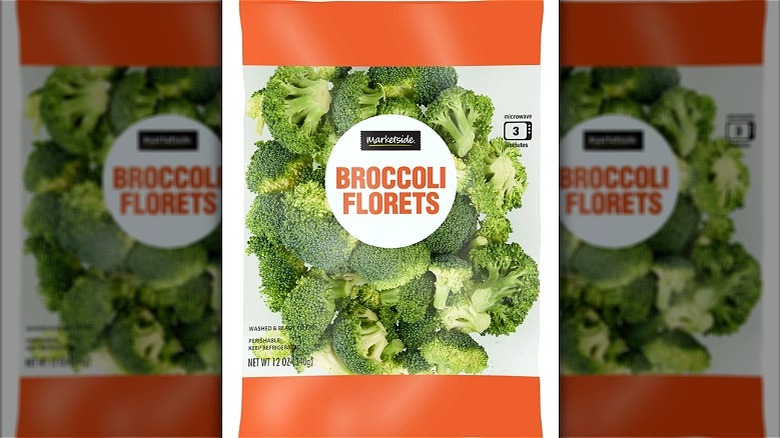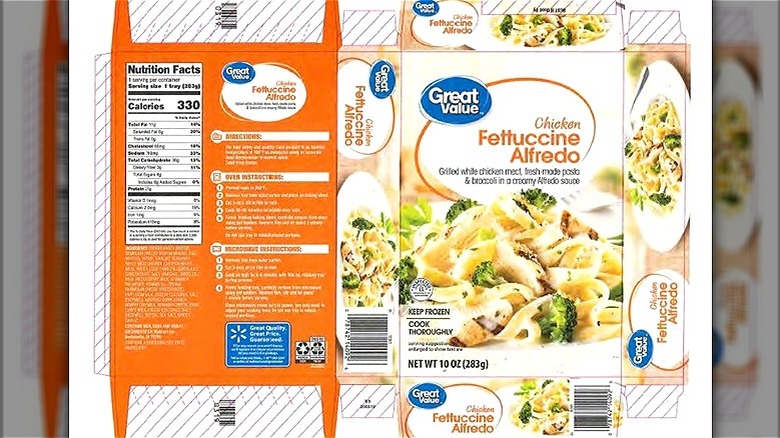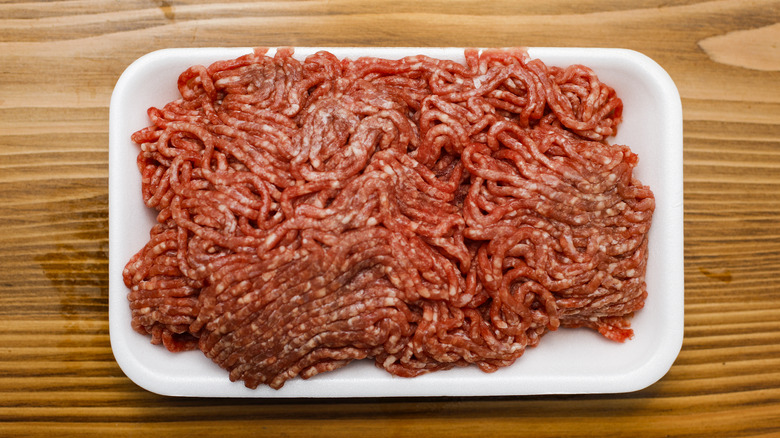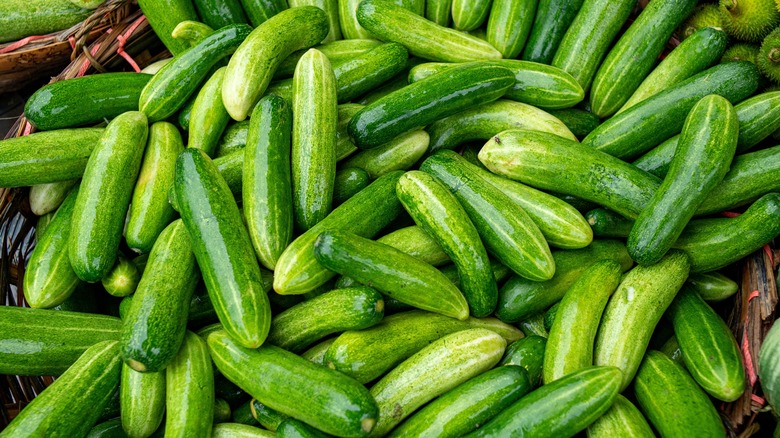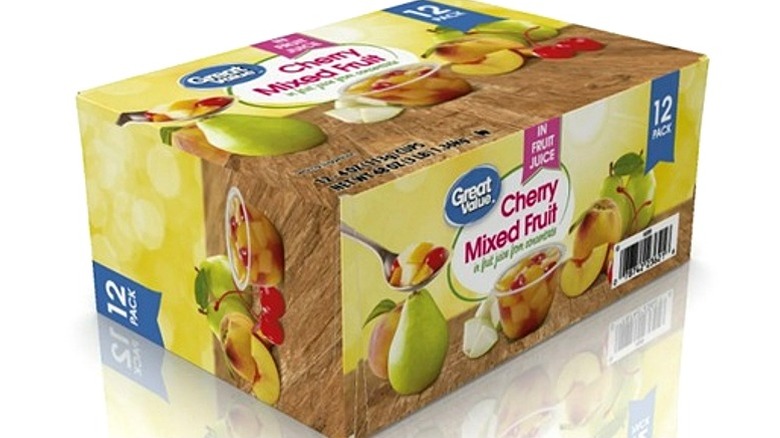The Biggest Food Recalls In Walmart History
Walmart shoppers are a loyal bunch. The giant retailer has long been a preferred place where people go to buy their groceries, whether in-store or online. These days almost 60 percent of Walmart's revenue comes from food sales and the chain accounts for nearly 30 percent of all online U.S. grocery sales. With its addition of shoppable content, Walmart has wooed home cooks by encouraging the purchase of ingredients via recipes — acting as an all-in-one, recipe-to-table shopping experience. But, like most large food retailers, Walmart has not escaped unscathed when it comes to food recalls.
Between 2002 and 2023, there have been more than 35,000 food recalls in the U.S. Incredibly, this number has jumped by an estimation of 20 percent from 2020 to 2023 alone. Recalls typically stem from food suppliers and can span across various retailers — Walmart being among them. Though it's hard to say just how many food recalls Walmart has experienced in its almost 40 years of selling groceries, there have been a handful over the last two decades worth noting. Recalls included one of the largest food safety criminal cases that ended in a multi-million dollar penalty and one of the largest food recalls in history that resulted in 36 million pounds of recalled turkey.
2006: Peanut butter contaminated with salmonella
In one of the largest and worst food recalls in U.S. history, peanut butter was pulled from retailer's shelves nationwide after being linked to a large salmonella outbreak that sickened more than 700 people and likely thousands more unreported. Walmart's brand, Great Value, and the brand Peter Pan were affected. The contamination was discovered after an influx of salmonella illness was reported in Tennessee in 2006, prompting an investigation to find the source. The main symptoms reported were diarrhea, abdominal cramps, fever, and dysuria. 20 percent of those involved were hospitalized but there were no reported deaths.
Testing discovered salmonella in both opened and unopened jars of peanut butter across 13 states and further investigation traced the problem to ConAgra Foods, Inc., specifically its manufacturing facility in Georgia. Production at the Georgia plant was terminated and all peanut butter was recalled. However, ConAgra was charged with a misdemeanor for knowingly shipping peanut butter that was tested and confirmed to be contaminated with salmonella, as far back as 2004. In one of the largest food safety cases to go to court, ConAgra was fined with an $11.2 million penalty.
Peter Pan peanut butter stayed off the shelves for about six months while the Georgia facility got much-needed updates. Officials blamed a leaky roof, malfunctioning equipment, and employee incompetency as the reason for the outbreak of salmonella.
2009: Pistachios tested positive for salmonella
In 2009, multiple samples of pistachio nuts and products containing pistachios were tested over several months and found to be contaminated with multiple types of salmonella. An investigation into the matter by the Centers for Disease Control led to Setton Farms and resulted in more than 2 million pounds of pistachios being recalled. Setton Farms halted production and stopped distributing its roasted shelled, roasted in-shell, and raw shelled pistachios. As part of the massive recall, Walmart pulled back all Setton Farms pistachio products from its stores.
Setton Farms California Pistachios is the second largest pistachio producer, selling to Kraft Foods and 35 other wholesalers, including overseas. Only a few illnesses were connected to the salmonella contamination but due to the widespread distribution of the pistachio nuts, it was a substantial recall that included bagged nuts, cakes, cookies, snacks, ice cream, and other baked goods. Salmonella can cause fever, diarrhea, and abdominal cramps.
2010: Foreign material found in chicken nuggets
Prompted by consumer complaints, more than 90,000 pounds of chicken nuggets were once recalled due to the potential of the product containing foreign material. In 2010, Perdue Farms, Inc. detected small, blue pieces of plastic in some of its nuggets after investigating customers' claims. The bagged chicken nuggets were sold under Walmart's Great Value brand and shipped nationwide. There were no reports of injury or illness, but customers were urged to get rid of the 1-pound, 13-ounce bag of fully cooked nuggets or return to it to the store for a full refund.
In a similar recall in 2024, Perdue Farms, Inc. voluntarily recalled more than 167,000 pounds of frozen breaded chicken breast tenders and nuggets, also because of foreign material. Customers alerted authorities of thin strands of metal inside the nuggets. An investigation found malfunctioning equipment during the manufacturing process. No injuries or illnesses have been reported.
2011: Ground turkey tainted with resistant strain of salmonella
Recorded as one of the largest Class I food recalls in the U.S., Cargill Meat Solutions Corporation recalled 36 million pounds of ground turkey in 2011 after it was discovered to be linked to a salmonella Heidelberg outbreak. This particular salmonella strain is highly resistant to treatment, and the outbreak resulted in one death and more than 35 people hospitalized. Overall, there were more than 130 reported illness nationwide. But the recall wasn't announced until after the death of a California man. Though testing found salmonella in ground turkey samples prior to the recall, food safety officials claimed there wasn't enough evidence to formally recall the turkey.
Cargill's Arkansas facility stopped production and attempted to find the source of the contamination. It did a thorough cleaning and inspection before resuming operation. Unfortunately, Cargill shut down production again shortly thereafter and recalled another 185,000 pounds of ground turkey. The double whammy recall cost the company millions of dollars per week and included employee layoffs as well.
2016/2017: Mac and cheese recalled due to salmonella risk
After salmonella was discovered at the manufacturing facility of Valley Milk Products, a federal seizure took more than 4 million pounds of milk products from its plant in Virginia, citing unsanitary conditions. A Food and Drug Administration investigation determined the company had previous positive test results for both its environment and finished products but were still distributing its product to suppliers. According to Valley Milk's website, salmonella was never found in its finished product. But it recalled its 50-pound bags of nonfat, high-heat milk powder and sweet cream buttermilk powder due to the potential risk of contamination.
Valley Milk Products does not sell directly to customers, but as a result of the recall, TreeHouse Foods, Inc. voluntarily recalled its macaroni and cheese products due to its powdered milk ingredient. These products included Walmart's Great Value brand macaroni and cheese cups, which were pulled from the shelves nationwide. No illnesses were ever reported, however.
2016: Listeria concerns sparked recall of frozen vegetables
National Frozen Foods Corporation issued a voluntary recall in 2016 after a sample testing of its frozen green peas and mixed vegetables indicated they could be contaminated with listeria monocytogenes. The 11 varieties of frozen vegetables were shipped to various retailers nationwide, as well as to Canada, which affected a wide range of brands including Walmart, Target, Sprouts, and Bountiful Harvest. The recall was for organic and traditionally grown veggies, and products included Walmart's Great Value mixed vegetables, steamable mixed vegetables, and sweet peas. Out of caution, Walmart pulled all of its frozen peas and vegetables from its stores.
It was initially reported there were no illnesses connected to this vegetable recall, but investigation by the Centers for Disease Control determined a multi-state listeria outbreak was indeed connected. Nine people were hospitalized across four states. Three died, one of which was potentially from listeriosis.
Listeria can cause fever, headaches, nausea, diarrhea, and abdominal cramps. It's especially dangerous for and can cause serious infections in susceptible individuals. In one of the worst listeria outbreaks in U.S. history, tainted cantaloupes were to blame for 143 hospitalizations and 33 deaths.
2016: Possible undeclared peanut allergen in packages of pretzels
As one of the many food recalls that will always haunt Frito Lay, the company voluntarily pulled back select varieties of Rold-Gold pretzel products due to an undeclared peanut allergen. As a precautionary measure, Frito Lay announced a recall on Rold-Gold twists, thins, sticks, and braids after one of its suppliers recalled flour for undeclared peanut residue. The potentially tainted pretzel products were sold across the U.S. in retail stores — including Walmart, vending machines, and via food service purveyors. No illnesses were ever reported.
A peanut allergy is one of the most common food allergies that can result in anaphylaxis, a life-threatening reaction that can cause airways to constrict, making it difficult or impossible to breathe. Even a small amount of peanut protein can trigger a reaction in some individuals. This food allergy is more common in children than adults, and in some cases children outgrow it.
2018: Eggs recalled due to potential salmonella contamination
In 2018, Rose Acre Farms voluntarily recalled more than a whopping 206.7 million shell eggs due to the possibility of them being contaminated with salmonella. The recall was issued after multiple reports of foodborne salmonella illness. An investigation by the Food and Drug Administration — using interviews, lab results, DNA fingerprinting, and traceback evidence — determined the likely culprit of the multi-state salmonella outbreak to be shell eggs produced at the Hyde County farm in North Carolina, Rose Acre Farms.
The particular bacterial strain identified — Braenderup — can cause serious issues in susceptible individuals and may lead to death. Healthy people may experience fever, nausea, diarrhea, and vomiting. Rose Acre Farms distributes its shell eggs to multiple restaurants and retailers across the country, including Walmart. Walmart sells the eggs under its Great Value brand. There was a total of 45 reported illnesses due to the salmonella infection across 10 states with 11 hospitalizations. Fortunately, there were no deaths reported.
2019: Frozen berries tested positive for norovirus
In 2019, testing done by the Food and Drug Administration showed positive results for norovirus in connection to frozen berries. As a result, Alma Pak in Georgia recalled multiple lots of its frozen blackberries, which affected retailers, Walmart and Save-A-Lot. Walmart's Great Value brand of 16-ounce frozen blackberries was pulled from the shelves of seven states, as well as Puerto Rico, though no illnesses were reported. Save-A-Lot removed its 12-ounce Tipton Grove frozen mixed berries from six states.
Norovirus is a contagious virus that can cause unpleasant symptoms over a period of a couple of days. Symptoms include acute or severe diarrhea, nausea, and vomiting. Some folks may experience headaches, chills, and fatigue. The Centers for Disease Control and Prevention states that norovirus is the leading cause of foodborne illness in the U.S. and accounts for 58 percent of foodborne illness.
2019: Metal fragments found in chicken strips
Tyson Foods, Inc. announced a recall in 2019 for nearly 12 million pounds of ready-to-eat chicken strip products as a result of consumer complaints of finding embedded metal pieces. Due to the potential safety hazard, Tyson Foods made the decision to pull back the products suspected of being affected. Chicken products were sold to numerous retailers and wholesalers nationwide, as well as the Virgin Islands. The chicken strips were also exported overseas. Included in the long list of brands that were recalled was Walmart's Great Value, sold as 20-, 25-, and 40-ounce bags.
There was a total of six complaints due to the metal fragments and three of those alleged oral injury as a result. Tyson Foods responded by discontinuing its use of the equipment believed to be the cause of the issue. In addition, the company claimed to be installing metal-detecting machinery and working with a third party to ensure external auditing for metal detection.
2021: Onions linked to salmonella outbreak
After a multistate outbreak of salmonella in 2021, an investigation into the matter led to a widespread recall of fresh, whole onions in the U.S. Red, white, and yellow onions that were imported from Mexico were suspected of being contaminated with salmonella. The suppliers, ProSource Produce, LLC of Idaho and Keeler Family Farms from New Mexico, voluntarily pulled back bags and cartons of potentially affected onions from retailers and restaurants. The recall also included meal kits that contained onions from these suppliers.
Onions from ProSurce Produce were shipped to 35 states, as well as Canada and onions from Keeler Family Farms were shipped to multiple states. Brands at various Walmart locations across the country were affected by the recall. Though this was a large recall, no onions ever tested positive for salmonella. Most of the onions couldn't be tested anyway since imports had stopped and growing season was complete. The CDC reported a total of 1,040 illnesses and 260 hospitalizations. Fortunately, there were no deaths connected to this recall.
2024: Broccoli tested positive for listeria
In December 2024, Braga Fresh issued a voluntary recall of washed and ready-to-eat broccoli florets due to the possibility of being contaminated with listeria monocytogenes. A random testing of the broccoli from one Texas store resulted in multiple positive markers for listeria. Fortunately, no illnesses were ever reported in connection to this discovery, but a nationwide recall was ordered by the supplier as a precautionary measure. Braga Fresh shipped broccoli to various Walmart locations in 20 states. The products pulled from Walmart shelves were bags of Marketside broccoli florets.
An infection from listeria is actually rare but can be a life-threatening illness. Typical symptoms of a listeria infection include headache, fever, and flu-like symptoms such as muscle ache and fatigue. Though the average individual can usually fight off an infection, the CDC estimates 260 people die from it each year — less than 20 percent of those infected.
2024: Ready-to-eat chicken tested positive for listeria
BrucePac ready-to-eat meat and poultry products were recalled due to the potential risk of listeria infection. This widespread recall affected more than just retailers and restaurants; it also affected multiple schools. Almost 12 million pounds of meat and a wide variety of brands were marked for removal. Routine testing discovered the presence of listeria monocytogenes in BrucePac's finished ready-to-eat poultry products. Further investigation showed the original source was the chicken.
Ready-to-eat meat and poultry products from Walmart included its own brand, Great Value, and encompassed a variety of chicken meals and dishes, such as creamy chicken and pasta, chicken fettuccine alfredo, and southwestern style chicken and pasta. Other brands included El Monterey, Red's, Jenny Craig, and Michelina's. An infection from listeria monocytogenes can cause life-threatening symptoms in susceptible individuals with weakened immune systems, but there were no confirmed reports of anyone getting sick due to the chicken products.
2024: Ground beef products potentially tainted with E. coli
Cargill Meat Solutions voluntarily recalled more than 16,000 pounds of ground beef in 12 states due to the potential contamination of E. coli. The recall was prompted by the Pennsylvania meat manufacturer when it identified a prior segregated product had inadvertently been used when producing the ground beef. Out of an abundance of caution, potentially affected products were pulled from the market. The raw ground beef products included trays of all protein/fat percentages of ground beef, prime rib burgers, and beef chuck and sirloin patties. Beef products were shipped to Walmart locations across the country.
E. coli has the potential to cause serious illness. This foodborne bacteria can cause dehydration, diarrhea, abdominal cramps, and vomiting. While most people are able to recover in a matter of days, susceptible individuals may develop more serious symptoms warranting a trip to the hospital. Fortunately, there were no reported illnesses in connection with the ground beef recall.
2024: Cucumbers linked to salmonella illnesses
In November 2024, SunFed Produce, LLC recalled all sizes of fresh, whole cucumbers on the chance they might have been contaminated with salmonella. They were shipped all over the country to 26 states, but also to multiple provinces of Canada. Cucumbers were sold to retailers and food service companies, including various Walmart stores across the country. As a result of this recall, Walmart then recalled Marketside Fresh Cut Cucumber Slices that it sold in select Texas stores due to a positive link between the whole cucumbers and multiple reported salmonella illnesses.
At the same time and in addition to the two cucumber recalls for Walmart, Baloian Farms recalled express meal kits from Fresh Creative Foods that contained cucumbers in its sauce due to concerns of salmonella contamination. These meal kits were sold at select Sam's Club locations. No illnesses have been reported in relation to this particular recall and Fresh Creative Foods no longer buys cucumbers from that supplier.
Eight months later, Walmart once again recalled cucumbers because of listeria concerns. Wiers Farm Inc. in Ohio recalled bagged and whole vegetables, including cucumbers sold to Walmart, after an investigation discovered a possible contamination problem. No illnesses were reported.
2024: Undeclared — now banned — ingredient in mixed fruit
In October 2024, Walmart recalled 852,731 units, including all lot codes, of Great Value mixed fruit varieties because of what was, at the time, an undeclared ingredient: red dye No. 3. Walmart never issued a press release but filed a voluntary nationwide recall of Great Value diced peaches, mandarins, and cherry 4-ounce, 12-pack variety and cherry mixed fruit 4-ounce, 4-count and 12-count packages.
Red dye No. 3 has been under scrutiny for years, being labeled as a carcinogen. It was long ago banned in topical products and other countries have already banned its use entirely. Many manufacturers have phased out using the dye but like Walmart's fruit, some brands still contain this controversial ingredient. But recent action from the FDA has halted authorization of using red dye No. 3. Popular food products like strawberry ice cream, vibrant colored candy, novelty snack cakes, and Valentine-oriented baked goods still rely on the red dye to create a bright pink color.
